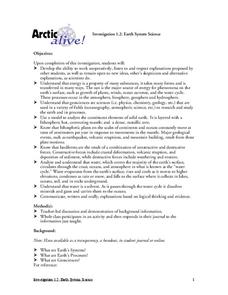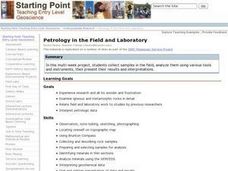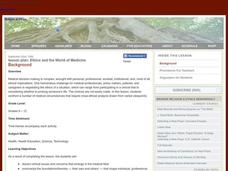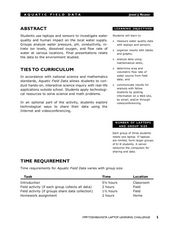Curated OER
Earth System Science
Students explore the Earth and its ability to support life. They discuss the geosphere and the water cycle and complete the Water Wonders activity. After completing the activity, they respond in their journals and reflect upon the...
Curated OER
Locating Vent Fields Using CTD Data
Students describe the way hydrothermal vents work. Students work on locating vent regions through remote collection of data about water temperature and density. Comparing density and temperatures graphs, students search for indicators...
Curated OER
"The Science Times"
Students create their own newspaper after gathering information at the Museum of Natural History's Hall of Biodiversity.
Curated OER
Field Trip - Marine Science Institute
Young scholars discover the ocean life of the San Francisco Bay. In this ocean lesson, students take a Discovery Voyage of the Bay ecosystem through the Marine Science Institute. Also available are inland voyages, ocean labs, and...
Curated OER
Field Research Project: Comparing the Parent Rock Material of the San Francisco Terranes With Local Soil Types
Students investigate rocks and minerals and take a field trip to sample soils. They analyze rocks and soil, research the geological terrenes of the topology of San Francisco, and produce a lab research report.
Curated OER
Petrology in the Field and Laboratory
Students collect samples in the field, analyze them using various tools and instruments, then present their results and interpretations. They examine igneous and metamorphic rocks in detail and interpret petrologic data.
Virginia Department of Education
DNA Structure, Nucleic Acids, and Proteins
What is in that double helix? Explain intricate concepts with a variety of creative activities in a lesson that incorporates multiple steps to cover DNA structure, nucleic acids, and proteins. Pupils explore the history of DNA structure,...
Curated OER
Move It!!!
Students explore motion by observing the movement of people and duplicating those movements. They compare and contrast various kinds of movements and identify different types of movements in pictures. They build an object that can be...
Teach Engineering
Start Networking!
Class members create their own social networks by collecting signatures before graphing the interactions with their fellow classmates. The degree distribution of the simulated social network is determined by calculating the degree of...
Curated OER
Oh! The Places I CAN See!
Students explore landmarks around the world. In this world geography and technology lesson, students view world landmarks using a webcam. Students take a virtual field trip during which they zoom in and manipulate three dimensional...
Curated OER
"I WONDER!"
Students explore a variety of age-appropriate resources. They answer a teacher-selected question about a science or social studies topic. They locate and review age-appropriate resources and provide practice in using the resources...
Curated OER
Ethics and the World of Medicine
Learners examine ethical issues in the field of medicine. In this ethics lesson, students explore primary and secondary sources regarding the discernment that medical professionals are presented with as they treat illnesses. Learners...
Curated OER
Who Knows?
Students come up with questions that they may ask an expert in a particular field. They contact those experts and ask their questions.
Curated OER
Weather Proverbs
Students investigate various concepts related to weather. They conduct historical research to see how the study of weather originated and the application of the latest technologies in the field. Students summarize the information with...
Curated OER
Aquatic Field Data
Students use laptops and sensors to measure water quality and graph their results. In this aquatics activity students post their results to a website or email.
Curated OER
Women In Aviation
In this aviation lesson plan, students take an electronic field trip to the Aviation Museum of Kentucjy. In the process the lesson plan looks at women in aviation history. The focus is upon how they could be considered heroes or role...
Curated OER
The Living Environment
Learners explore the cycles of an ecosystem. In this environmental science lesson plan, students work in groups to research the nitrogen cycle, the water cycle, or the oxygen-carbon dioxide cycle. Learners prepare a PowerPoint or...
Teach Engineering
Complex Networks and Graphs
Show your class how engineers use graphs to understand large and complex systems. The resource provides the beginnings of graph theory by introducing the class to set theory, graphs, and degree distributions of a graph.
Curated OER
Stream Chemistry Monitoring
Students become familiar with real-world gathering of chemical data. The experience how the science is done: the nature of analysis, data collection, interpretation, and presentation. They study a nearby body of water for their experiment.
Curated OER
Bird Populations
students study bird migratory patterns and the methods that researchers use to study them. Students are introduced to the concepts of the study of bird movements.The skill of scientific questioning is used to find results.
Curated OER
Ice Core Research
Students study the work of Dr. Hajo Eicken through an audio conference. They engage in a conference call with Dr. Eicken to identify how ice core research is designed and conducted. After asking Dr. Eicken questions, they record their...
Curated OER
Rocky Observations
Students examine two images of rocks, make their own observations of individual rocks through drawing, and explain how the same observation skills can be used in the study of geology.
Curated OER
How Do Weather Conditions and Lunar Cycles Affect Fishing Success?
Students use weather measuring devices to record and study weather conditions at different locations, during different times. They attempt to draw conclusions about the relationship between weather conditions, lunar cycle and fishing...
Curated OER
Going Buggy!
Students study bugs over a four week period. In this insect collection of activities, students observe insects covering basic science concepts and skills, such as classification, observation, and responses to habitat....























